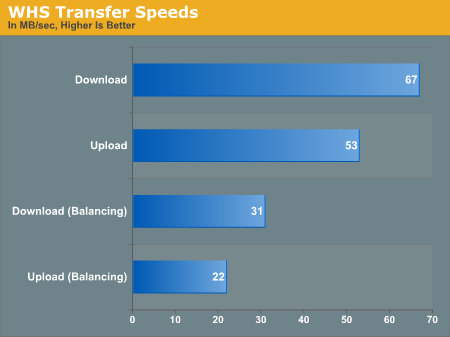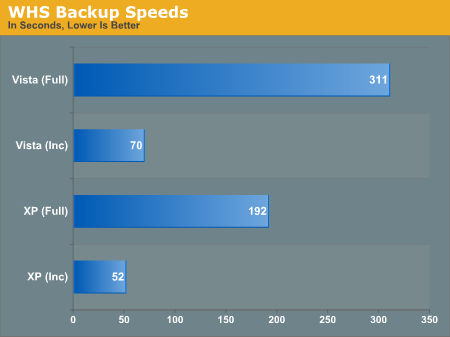A New Kind of Home Computer: Windows Home Server Preview
by Ryan Smith on September 4, 2007 1:00 PM EST- Posted in
- Systems
Performance Data
Because we were only able to get our hands on a release candidate version of WHS for the performance testing, all the results here need to be taken with a grain of salt. The WHS RC is quite good, especially in comparison to rockier launches like Vista, but we expect the performance numbers in particular to have changed slightly between the RC and the final version.
It's worth noting that the network packet throttling problem with Vista is still in play as of this writing. As a result all of our tests are under Windows XP SP2 unless otherwise noted, and when they're run on Vista it is with Multimedia Class Scheduler Service disabled to prevent throttling. Although this problem has existed in Vista since it has shipped, this is about the worst time it could come to light for Microsoft. Until it's fixed, Vista users wanting to move their media off of a personal computer and onto a WHS server will definitely want to hold off on doing so. Even though the problem with throttling isn't one with WHS, the problem occurring in Vista still drags down WHS.
| Client Test Bed | |
| Processor | Intel Core 2 Quad QX6850 (3.00GHz/1333MHz) |
| RAM | G.Skill DDR2-800 (2x2GB) |
| Motherboard | Gigabyte GA-P35-DR3R (Intel P35) |
| System Platform Drivers | Intel 8.1.1.1012 |
| Hard Drive | Maxtor MaXLine Pro 500GB SATA |
| Video Cards | 1 x GeForce 8800GTX |
| Video Drivers | NV ForceWare 163.44 |
| Power Supply | OCZ GameXStream 700W |
| Desktop Resolution | 1600x1200 |
| Operating Systems | Windows Vista Ultimate 32-Bit Windows XP SP2 |
| . | |
| Server Test Bed | |
| Processor | AMD Athlon X2 4600+ (2.40GHz/400MHz) |
| RAM | OCZ DDR-400 (4x512MB) |
| Motherboard | ASUS A8N-SLI Premium (nForce 4 SLI) |
| System Platform Drivers | NV 6.69 |
| Hard Drive | 2x Western Digital Caviar Raid Edition 2(400GB) |
| Power Supply | OCZ GameXStream 700W |
| Operating Systems | Windows Home Server RC |
| . | |
We'll start with testing WHS's file server abilities by transferring files back and forth. With a gigabit network, the bottleneck will be the transfer abilities of our hard drives, so if WHS is achieving maximum performance it should be able to move data at speeds around the maximum of our hard drives. We'll be using a RAM disk on the client side to isolate the performance of WHS.
Also on this graph will be the performance of WHS while attempting to do file transfers in the middle of a balancing operation. Because of the importance in balancing data for data retention and performance reasons, WHS will sometimes need to balance folders even during times of backups and file transfers. This doesn't seem very common in our use since it's related to total use of the WHS server, but it needs to be noted all the same. WHS does seem to take steps to avoid balancing during heavy use when possible.

At 53MB/sec up and 67MB/sec down, the results are very close to those that we've seen WD RAID edition hard drives do previously. For users with gigabit networks, it looks like it's very possible for WHS to offer performance virtually equal to having the drives installed locally. Speeds while balancing aren't very impressive though, not that we expected them to be.
The other metric of WHS's performance is how it handles backups. Unlike pure file transfers, backups aren't "brain-dead" operations and require work on behalf of both the server and the client. The client needs to figure out what data is to be sent to the server, and the server is responsible for keeping all of that data organized and compressed. WHS backup performance is also heavily dependent on what else is already in the backup cache, because WHS avoids backing up anything redundant down to the cluster level.
These specific tests were run with empty caches as a worst-case scenario; actual performance of the initial backup on a new machine (as long as it's not the first machine) should be faster. These tests are being done on clean Windows installations, with the second "incremental" backup being done immediately after the first backup completes. This is more optimistic than a real incremental backup since virtually no data changes, but in doing it this way we can establish a floor for approximately how long the scan process takes. The reference sizes for these installations are 2.3GB for XP and 5.4GB for Vista, after factoring out the system page file and other files that WHS backup filters out.

Both Vista and XP turn in respectable, although not amazing backup times. Using the incremental backup as the baseline, we achieved an average backup speed of about 20MB/sec. This is well below what we've seen on our file transfer tests, but still fast enough to complete these backups in a short amount of time; since WHS doesn't have any true peers we don't have anything else to properly compare it to. In an actual deployment with real incremental backups and common data, we expect the results to be a lot closer to that of the incremental times.
We also took the liberty of backing up the XP machine again once the Vista machine was backed up in order to measure the size of the backup cache on the WHS server. Even with these clean installs, there's about 2GB of savings on the WHS server; 7.7GB of data is only taking up 5.7GB of space. Like Previous Versions on Vista, these savings should grow as more data is added to the backup cache.










128 Comments
View All Comments
Aileur - Tuesday, September 4, 2007 - link
Nice articule!First of all, a typo (im guessing)
Page 7: Simply put, there is no integration between the two. By default WHS and MCE are completely //obvious// to each other.
Im guessing that should be oblivious?
And a question:
On page 6 it is mentionned that there is a solution for non domained networks and all that. Fine, but what if i DO have a domain? Is there any way to integrate it without using that bypass method?
Can it (whs) be my domain controller?
Thanks!
Ryan Smith - Tuesday, September 4, 2007 - link
Unfortunately WHS does not have domain controller support. I haven't seen a reason why, but it's a safe assumption this is so there's a greater difference between WHS and 2K3SBS.It also doesn't support joining a domain.
yyrkoon - Wednesday, September 5, 2007 - link
Does not even have software RAID support, at least the last time I ran the beta . . .cannot believe you guys are just_now writting an article on it, but, I suppose maybe you guys had a NDA in effect ? Anyhow, I have a hard time embracing *any* OS that is supposed to be a server product and does not implement software RAID period, but I supose they think their backup scheme is better ? No reason to 'force' it onto others.
The main reason I think it does not have a DC is that this is meant for home storage only. I.E. a very limited form of Windows 2003. I ran it on my secondary system for a few days, and decided I would probably rather run XP Pro, or Win2003 datacenter(or one of the other variants, maybe even Linux) at this capacity.
PrinceGaz - Wednesday, September 5, 2007 - link
Just a wild guess from me here, but I think most home-users would be put off by the US$ 2,999 price-tag of Windows 2003 Datacenter edition.mino - Tuesday, September 11, 2007 - link
Good guess :)Anyway, Win2000 is pretty much enough for any home serving and 2nd-hand licences goes pretty cheap (especially when security support is likely to match even extend currently sold XP licences...).
Just my 2 cents.
mino - Tuesday, September 11, 2007 - link
Win2000 Server, of course.Also, as a sidefect of standard win200 kernel it usually does not have problems with TV tuners...
tynopik - Wednesday, September 5, 2007 - link
> Anyhow, I have a hard time embracing *any* OS that is supposed to be a server product and does not implement software RAID period1. it's a HOME server, not a corporate server
2. it is better than RAID (at least for it's intended audience)
disks of any size can be added or removed at any time, yet files are still physically duplicated on different disks, that is very flexible and powerful
i love this feature so much i wish they would include it in regular windows
leexgx - Tuesday, September 4, 2007 - link
nothing stopping you seeing it on the network still